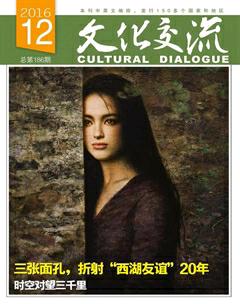与夏梦的三“面”之缘
晓柒

2016年11月3日,被誉为“东方版奥黛丽·赫本”“香港最漂亮女演员”夏梦去世,享年83岁。
夏梦自上世纪50年代起,在香港从影17年,演过38部电影,塑造了不少令人印象深刻的角色,是后来许多香港明星心中的“大明星”。
我与这位女星曾有三“面”之缘,值得回忆。
一面:画中情思
最早的“谋面”在照片上。2010年,海宁袁花镇金庸旧居刚刚翻新,我慕名而至,试图从金庸生活过的地方,寻找他的创作痕迹。
在展示的近千张老照片中,有一张年轻的金庸与一位身着旗袍的女子的合影引我关注。那女子一股书卷气,美貌不可方物。照片下面的一句说明更有意思:“西施怎样美丽,谁也没见过,我想她应该像夏梦才名不虚传。——金庸。”
我一下子记住了“夏梦”这个名字。后来我才知道,那是一个原名“杨濛”的演员的艺名,取自《仲夏夜之梦》,而她似乎确能映衬一代美人的气质。
据说,金庸曾经加盟长城电影公司,以“林欢”为笔名任职编剧,为他眼中“像西施一样美丽”的女人度身打造历史片《绝代佳人》。武侠大师为夏梦当个小编剧的轶事,当年人尽皆知,华语文学圈里甚至有人评说,黄蓉、王语嫣、小龙女、岳灵珊等角色,都有夏梦的影子。
这当然只是传闻了,但夏梦的美丽,确实被港、陆两地文化圈所公认。影视评论家石川这样评价夏梦:“是传统士大夫心中理想女性的化身,又是承载着上世纪三四十年代民国文人家国梦想的梦中情人。”导演、编剧们都对夏梦青睐有加,王家卫说她是“第一古典美人”,岑范则为她终生不娶,梁羽生、倪匡等人对她总是赞叹不已,并把这位“长城大公主”的美,推广成传说。
祖籍苏州的夏梦,天生带着江南水乡的灵韵。1933年2月,夏梦生于上海的一个文艺之家,让她从小热爱传统戏曲。1947年,夏梦随父母移居香港。就读马利诺书院期间,夏梦热衷于舞台剧演出,并写得一手好文章,这为她后来的发展打下了基础。
二面:事业情操
第二次谋面,我见到了夏梦。2014年,上海电影博物馆举行纪念夏梦从影65周年活动。那天,艺术影厅里座无虚席,都为一睹多年不露面的夏梦真容。我有幸躬逢盛会,聆听夏梦讲述从影的历程。
有人请夏梦谈谈她和金庸的事,夏梦思虑良久后给出的答复是“不如不说”。夏梦是电影界演技与人品俱佳的难得一见的“标准的女人”。始终洁身自好的她,给自己约法三章,不为人剪彩,不应酬吃饭、不拍内容不健康的戏。她在家中也不挂一张剧照,只是专心相夫教子。
1950年,夏梦进入演艺圈,通过《禁婚记》脱颖而出。她把杨霞芝刻画得淋漓尽致,而这个角色原本是为刚离职的李丽华打造的。此片成为当年的港产国语片票房冠军。回忆那时候的表现,夏梦说自己从没学过表演,也不会紧张,所以大家都觉得自然。夏梦谈起好演员的标准,认为天赋是第一因素。
夏梦有不少作品,《孽海花》成为第五届爱丁堡国际电影节展映的19部电影之一,《都会交响曲》《姊妹曲》等也都大获成功。在“香港国语片十大明星”选举中,她名列第一。
2008年,大连举办金鸡百花电影节。大会为夏梦举办电影展,但夏梦因为身体原因没有出席,她录制了一段视频讲话说,“我是因为机缘巧合,参加了一份与众不同的工作,电影为我的人生增添了色彩,也给我许多值得回顾的难忘记忆。”在她看来,家、国息息相关,“香港(当时)还在英国高压殖民统治下,在艰难的环境下,我身边许许多多影人为了爱国电影事业无私奉献,也激励着我去做好一个演员的本分”。
三面:梦想情怀
第三次“谋面”,在他人的谈话中。2015年,我赴香港采访,听夏梦的生前好友、香港电影“教父级”导演吴思远谈夏梦。
采访从夏梦谈起,吴思远像被打开了话匣子:“这几年见面比较少,以往会在一些电影活动中相见,也经常聊天。”吴思远回忆:“她曾说非常希望自己能参加香港金像奖终身成就奖的评选,我觉得,无论是夏梦的演技或是作品,无论做演员还是当监制,她都应该得到这个奖项的首肯。”
事实上,夏梦除了演员的角色之外,后半生还担纲了许多电影监制的事业。1982年,监制许鞍华导演的《投奔怒海》时,夏梦甘愿损失一笔已经签好的合约订金,也务必要将剧本改到完美才开始。她选剧本的眼光也极为挑剔,在她看来,剧本是一部好影片的先决条件,也是最基本的要求。《投奔怒海》以及她于1984年监制的《似水流年》,分别包揽了两届香港金像奖最佳影片、最佳导演和最佳编剧奖。
2015年,上海国际电影节,夏梦获得华语电影终身成就大奖,她并未亲身到达现场,但特别送上了一段录制的短片,她说着家乡话与观众问好:“上海是我出生的地方,电影是我一生的梦想,有了这两样东西我感到幸福。”
是的,正是这样一份对电影的梦想情怀,构筑了我脑中一个立体的夏梦的形象,也构筑了她应该被人记住的一生。
(本文照片由作者提供)
Xia Meng passed away at the age of 83 on November 3, 2016. A film actress of classic beauty, she used to be known as the Audrey Hepburn incarnate of the east and the most beautiful woman of Hong Kong. As of the 1950s, she appeared in 41 films (according to Wikipedia) in Hong Kong over a period of 17 years. She is the biggest star in the memory of many cinema celebrities in Hong Kong. As a journalist born in the 1980s, I had run into her stories three times.
2010
The year 2010 was the first time when I ran into her story. Back then, the former residence of Louis Cha, a famed writer of novels about martial-art masters had been restored in Haining in northern Zhejiang. I went there to see if I could find the traces of his kungfu masterpieces. There were nearly 1,000 photos on display and one stood out. It presents Louis Cha in his youthful years and a young woman of stunning beauty. The caption was written by Louis Cha himself: “Nobody of today knows exactly how beautiful Xi Shi was. I think whether she deserves the fame depends on whether she looks like Xia Meng.”
The name Xia Meng burned into my memory at that moment. It was later that I learned that the name Xia Meng, which meant summer dream, came from Shakespeares comedy and that she was born as Yang Meng.
Louis Cha worked as a screenwriter at the Great Wall Movie Enterprises Ltd where Xia Meng was the crown princess. He wrote for Xia Meng, who was then 20 years old. Many people say that Xia Meng can be seen in many heroines of Louis Chas kungfu novels. Whether Louis Cha was in love with the heartthrob is only hearsay, but Xias beauty is widely recognized by film directors, screenwriters and critics.
2014
The year 2014 saw me attend a memorial event at Shanghai Cinema Museum in celebration of the 65th anniversary of Xia Mengs film career. The theater at the museum was full that day. Most of us there wanted to see Xia Meng personally. I count myself lucky to be there, hearing Xia tell the story of her career as a film artist.
When asked about her and Louis Cha, she considered the question and said it would be much better if she would rather not talk about it. It was just like her. Xia Meng as a film actress followed a set of three rules to discipline herself and keep a low profile. She did not attend opening ceremonies; she did not come to parties and banquets, she did not appear in films which she did not approve of. It is said that one did not see photos of her as actress around at her home and that she was dedicated to her husband and children.
2015
That year I was chatted with Ng See-Yuen, a “godfather-class” director and producer in the filmmaking industry of Hong Kong. Xia Meng came up as a subject in the conversation. The director confessed that he had not met Xia as frequently as he would like to in recent years. In the past, they had met in cinema events and had chatted quite a lot. Ng said that Xia said she wanted to be in competition for life achievement prize category of Hong Kong Film Awards. Ng agreed and said she qualified in terms of her acting and the films in which she appeared or the films she made as a producer.
She left Hong Kong for Canada in 1967 and came back in 1980. She founded a film company and became a film producer. In making in 1982, she chose to pay more in order to have the script perfected. The film later won several awards including the best picture and best director in the second Hong Kong Film Awards.
In 2015 she was honored special life contribution prize at Shanghai Film Festival. She did not appear at the ceremony but made a speech through a video. In the Shanghai dialect, she said hello to her hometown people: “Shanghai is where I was born and cinema is my lifelong dream. I am happy because of the two.”

